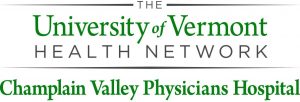On Sept. 10, BCEN was pleased to announce our 2020 National Certification Champion Award winners, including our Large Healthcare Organization category winner:

University of Vermont Health Network – Champlain Valley Physicians Hospital
Plattsburgh, NY
For our Meet the Winner Q&A with UVM Health Network – CVPH, we talked with Clinical Education Manager Gina Carbino, BSN, RN, CEN, CPEN, TCRN, CFRN, CTRN, CCRN, PCCN, SANE-A, who nominated CVPH.
What does the BCEN National Certification Champion Award mean to your organization?
We are truly humbled to be an award recipient. We have worked very hard to recognize our nurses, and our nurses have worked very hard to become certified.
Board certification is something we are very proud of. Today, 48% of our ED nurses hold one or more of the five BCEN certifications. Fully 100% of our emergency physicians are board certified, and our five-year goal is to work towards 100% of our ED nurses being board certified.
Objectively, when we have board certified nurses on staff, this means we can deliver the best possible care to our patients and our community. So, when a patient walks through the doors of Champlain Valley Physicians Hospital, they know they are getting the best care possible.
Why are you glad you have so many board certified emergency nurses on staff as you deliver care during the coronavirus pandemic?
We are in unprecedented times, and who better to provide care in these unchartered waters than board certified nurses. A board certified nurse objectively provides evidence-based practice and best care. You know that they know exactly what to do in crisis situations and how to adapt. Because they have passed that very challenging national board exam, they have demonstrated that they have the knowledge and critical thinking skills to handle it.
What continues to surprise you about the impact of BCEN certification?
Once a nurse becomes certified, I see a change in them. There is definitely a sense of pride they maybe did not show as much before. They are more confident in their actions—as in: I know this. I am a CEN®. I am proud to be board certified nurse.
Certification definitely improves teamwork and collaboration. One example of this is one of our nurses, while studying for the CPEN® exam, had a question about prostaglandin drips, and she was unfamiliar with our processes here at the hospital. When she came back from taking the test, she contacted Pharmacy to say: Do we have prostaglandin drip on formulary? How do we hang it? How is it delivered to meds? After getting the answers, she went around and rallied up all of our staff, and she educated them on that. So now, if we ever have that high-risk, low-frequency patient population, our staff has that education. When you have these certified nurses taking these initiatives and driving education and best practice amongst their peers, that is the best way that nurses can learn and engage in best practice.
What ROIs make your organization’s decision to prioritize supporting specialty certification for your emergency nurses a smart and wise choice?
You really cannot put a price on best practice. Patients who receive care from board certified nurses take great comfort in knowing that these professionals meet and exceed national standards and have demonstrated a tremendous level of clinical competence. There is no way to put a price on that peace of mind.
When nurses are board certified, they have that sense of self-pride, which I think helps with longevity. Confident, empowered nurses stay in the profession. When you have 48% of your nurses certified, like in our ED, there is a strong sense of pride in not only who they are and what they’re doing but in the ER they work in.
For organizations that are on the fence about supporting certification, what do you most want them to know?
Well, I think that certification affects the organization, your staff, and the community in all positive ways. There are really no negative outcomes to certification.
And it doesn’t have to be big. You do not need to set huge goals like 100% certified. You can start small, maybe by hosting a certification review course or having staff members buy material and forming a library so staff can share it.
Once staff start getting certified, it is infectious. We have multiple staff members that now have three or four BCEN certifications. Once one starts getting it, it just multiplies!
Read our Meet the Winner Q&As with Small Healthcare Organization category winner Childress Regional Medical Center and Healthcare System category winner Life Link III.
In case you missed it, you can read the Sept. 10 announcement of all the 2020 BCEN National Certification Champion Award winners here.
